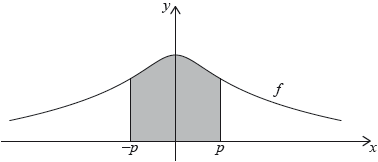| Date | November Example question | Marks available | 2 | Reference code | EXN.2.SL.TZ0.6 |
| Level | Standard Level | Paper | Paper 2 | Time zone | Time zone 0 |
| Command term | Calculate | Question number | 6 | Adapted from | N/A |
Question
A theatre set designer is designing a piece of flat scenery in the shape of a hill. The scenery is formed by a curve between two vertical edges of unequal height. One edge is metres high and the other is metre high. The width of the scenery is metres.
A coordinate system is formed with the origin at the foot of the metres high edge. In this coordinate system the highest point of the cross‐section is at .
A set designer wishes to work out an approximate value for the area of the scenery .
In order to obtain a more accurate measure for the area the designer decides to model the curved edge with the polynomial where metres is the height of the curved edge a horizontal distance from the origin.
Explain why .
By dividing the area between the curve and the ‐axis into two trapezoids of unequal width show that , justifying the direction of the inequality.
Write down the value of .
Use differentiation to show that .
Determine two other linear equations in , and .
Hence find an expression for .
Use the expression found in (f) to calculate a value for .
Markscheme
* This sample question was produced by experienced DP mathematics senior examiners to aid teachers in preparing for external assessment in the new MAA course. There may be minor differences in formatting compared to formal exam papers.
The area is less than the rectangle containing the cross-section which is equal to R1
Note: is not sufficient for R1.
[1 mark]
(M1)(A1)
A1
This is an underestimate as the trapezoids are enclosed by (are under) the curve. R1
Note: This can be shown in a diagram.
[4 marks]
A1
[1 mark]
A1
M1
hence AG
[2 marks]
Substitute the points and (M1)
and
A1A1
[3 marks]
Solve on a GDC (M1)
A2
[3 marks]
(M1)A1
Note: Accept from the three significant figure answer to part (g).
[2 marks]


